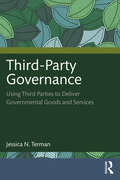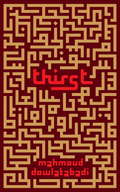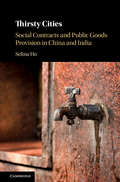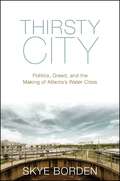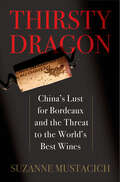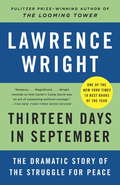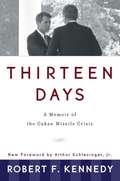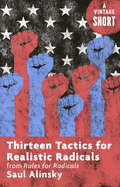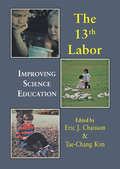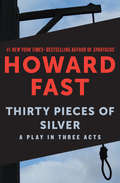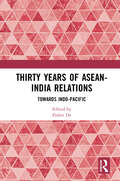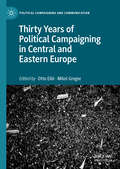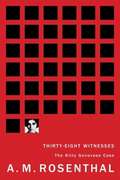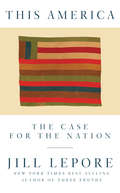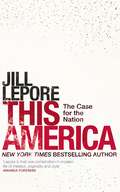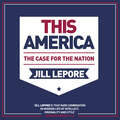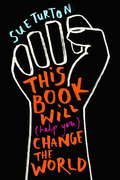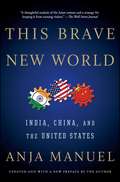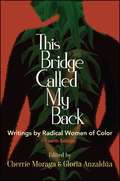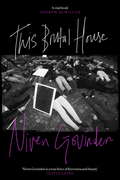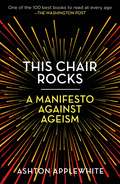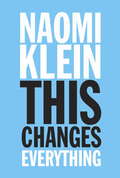- Table View
- List View
Third-Party Governance: Using Third Parties to Deliver Governmental Goods and Services
by Jessica N. TermanEvery year thousands of college students apply for and receive federally guaranteed loans to fund their educations in the United States. The loans are managed by nongovernmental entities – Sallie Mae, College Ave Student Loans – that indirectly implement the public goal of affordable higher education. Put another way, the US Department of Education relies on these nongovernmental entities for implementation of public policy via third parties. Where this kind of indirect implementation occurs, and how it differs from direct implementation, is the focus of this book, introducing readers to the theory and practice of third-party governance. It helps students understand market-oriented tools such as contracting, networks, public-private partnerships and other collaborative governance mechanisms that make up the repertoire of third-party governance. This background is, in turn, key to understanding modern governance arrangements all over the world.Author Jessica N. Terman explores the ‘whys’ behind government and the market, alongside the theories behind when one or both should be used. The book is filled with case studies exploring the issues at play in third-party governance, including transaction costs and the practices that mitigate transaction costs, as well as the advent of networks and how they have changed the governance structure of public policy implementation. Taking a jargon-free approach, the book is written as a primer on third-party governance, introducing readers to the ways that government is structured and the factors that influence contemporary policy implementation. Third-Party Governance will be required reading on courses related to public administration, public policy, and governance and collaboration.
Thirst
by Mahmoud Dowlatabadi Martin E. Weir"Dowlatabadi draws a detailed, realist picture of Iranian life . . . in language that is complex and lyrical." --The Financial TimesIn the midst of the Iran-Iraq War, an Iraqi journalist is given a tour of a military prison. The Major in charge of the camp informs the writer of what is expected: he is to write a fabricated report about a murder that has occurred in the camp, with the aim of demoralizing Iranian soldiers. Reluctant to write the report, the writer spends a long night talking and drinking with the Major and detailing a work of fiction he is composing about a group of soldiers trapped on a hill, dying of thirst as they battle for a water tank with a group of enemy soldiers perched on the opposite hill. The tank remains undamaged, but neither group has a hope of reaching it without being killed. In a narrative riddled with surreal images, shifting perspectives, and dark humor, Mahmoud Dowlatabadi--widely acknowledged as the most important living Iranian writer--offers a kaleidoscopic portrait of the warring countries as he questions the meaning of national identity and does something that has been nearly impossible to do in Iran for the last century: tell a true story.From the Trade Paperback edition.
Thirsty Cities: Social Contracts and Public Goods Provision in China and India
by Selina HoWhy does authoritarian China provide a higher level of public goods than democratic India? Studies based on regime type have shown that the level of public goods provision is higher in democratic systems than in authoritarian forms of government. However, public goods provision in China and India contradicts these findings. Whether in terms of access to education, healthcare, public transportation, and basic necessities, such as drinking water and electricity, China does consistently better than India. This book argues that regime type does not determine public goods outcomes. Using empirical evidence from the Chinese and Indian municipal water sectors, the study explains and demonstrates how a social contract, an informal institution, influences formal institutional design, which in turn accounts for the variations in public goods provision.
Thirsty City: Politics, Greed, and the Making of Atlanta's Water Crisis
by Skye BordenAtlanta is running out of water and is in the midst of a water crisis. Its crumbling infrastructure spews toxic waste and raw sewage into neighboring streams. A tri-state water war between Alabama, Florida, and Georgia has been raging since 1990, with Atlanta caught in the middle; however, the city's problems have been more than a century in the making. In Thirsty City, Skye Borden tells the complete story of how Atlanta's water ran dry. Using detailed historical research, legal analysis, and personal accounts, she explores the evolution of Atlanta's water system as well as charts the poor urban planning decisions that led to the city's current woes. She also uncovers the loopholes in local, state, and federal environmental laws that have enabled urban planners to shirk responsibility for ongoing water quantity and quality problems. From the city's unfortunate location to its present-day debacle, Thirsty City is a fascinating and highly readable account that reveals how Atlanta's quest for water is riddled with shortsighted decisions, unchecked greed, political corruption, and racial animus.
Thirsty Dragon: China's Lust for Bordeaux and the Threat to the World's Best Wines
by Suzanne MustacichAn inside view of China's quest to become a global wine power and Bordeaux's attempt to master the thirsty dragon it helped createThe wine merchants of Bordeaux and the rising entrepreneurs of China would seem to have little in common—old world versus new, tradition versus disruption, loyalty versus efficiency. And yet these two communities have found their destinies intertwined in the conquest of new markets, as Suzanne Mustacich shows in this provocative account of how China is reshaping the French wine business and how Bordeaux is making its mark on China.Thirsty Dragon lays bare the untold story of how an influx of Chinese money rescued France's most venerable wine region from economic collapse, and how the result was a series of misunderstandings and crises that threatened the delicate infrastructure of Bordeaux's insular wine trade. The Bordelais and the Chinese do business according to different and often incompatible sets of rules, and Mustacich uncovers the competing agendas and little-known actors who are transforming the economics and culture of Bordeaux, even as its wines are finding new markets—and ever higher prices—in Shanghai, Beijing, and Hong Kong, with Hong Kong and London traders playing a pivotal role.At once a tale of business skullduggery and fierce cultural clashes, adventure, and ambition, Thirsty Dragon offers a behind-the-scenes look at the challenges facing the world's most famous and prestigious wines.
Thirteen Days in September: Carter, Begin, and Sadat at Camp David
by Lawrence WrightA dramatic, illuminating day-by-day account of the 1978 Camp David conference, when President Jimmy Carter convinced Israeli Prime Minister Menachem Begin and Egyptian President Anwar Sadat to sign a peace treaty--the first treaty in the modern Middle East, and one which endures to this day.<P> With his hallmark insight into the forces at play in the Middle East and his acclaimed journalistic skill, Lawrence Wright takes us through each of the thirteen days of the Camp David conference, delving deeply into the issues and enmities between the two nations, explaining the relevant background to the conflict and to all the major participants at the conference, from the three heads of state to their mostly well-known seconds working furiously behind the scenes. What emerges is not what we've come to think of as an unprecedented yet "simple" peace. Rather, Wright reveals the full extent of Carter's persistence in pushing peace forward, the extraordinary way in which the participants at the conference--many of them lifelong enemies--attained it, and the profound difficulties inherent in the process and its outcome, not the least of which has been the still unsettled struggle between the Israelis and the Palestinians. In Thirteen Days in September, Wright gives us a gripping work of history and reportage that provides an inside view of how peace is made.
Thirteen Days: A Memoir of the Cuban Missile Crisis
by Robert F. KennedyWhen the United States confronted the Soviet Union over its installation of missiles in Cuba in October 1962, few people shared the behind-the-scenes story as it is told here by the late Senator Robert F. Kennedy. In this unique account, he describes the hour-by-hour negotiations, with particular attention to the actions and views of his brother, President John F. Kennedy.
Thirteen Tactics for Realistic Radicals: from Rules for Radicals
by Saul AlinskyA Vintage Shorts Selection From the founder of modern radical activism in America, Saul Alinsky, whose the bestselling classic Rules for Radicals has reinvigorated the political left in America. "Organizational genius" Alinsky lays out the thirteen rules that all have-nots must follow to wage a successful campaign against the haves. Wielding tremendous influence to this day, and used as a bible by leading organizers since it was first published almost fifty years ago, these vital words of wisdom are written with humor, wit and unassailable power. Crucially impactful on both President Obama and Hillary Clinton's political philosophies and dedicated to the American political tradition--Alinsky's thirteen tactics will remain powerful and relevant, a must-read, for anyone interested in how to enact constructive social change for years to come. An ebook short.
Thirteenth Labor
by Eric J ChaissonThis book is emerged from an insightful essay by the American Nobel chemist Dudley Herschbach, speculating about how the mythological Hercules might have tackled a hypothetical, monumental task, or "thirteenth labor," such as weighing the Earth's atmosphere.
Thirty Pieces of Silver: A Play in Three Acts
by Howard FastA couple in Washington, DC, is torn apart when a friend is accused of treasonJane and David Graham live upper-middle-class lives in mid-century Washington, DC. Jane minds the home with the help of a fulltime maid, and David works at the Treasury Department. But when the FBI visits their house one evening to ask questions about a friend&’s political beliefs, the answers the two give separately cause them both to wonder whether they truly know each other. Soon nothing is certain as the ideological fears plaguing the nation threaten to destroy Jane and David&’s family. Howard Fast&’s first play, Thirty Pieces of Silver was performed in several countries, from Australia to Europe, and offers an insightful look at the destructive power of reactionary politics in America. This ebook features an illustrated biography of Howard Fast including rare photos from the author&’s estate.
Thirty Years of ASEAN-India Relations: Towards Indo-Pacific
by Prabir DeIndia and the Association of Southeast Asian Nations (ASEAN) are civilisational partners and belong to a shared geography. They not only share land and maritime borders, engagements between India and ASEAN have expanded from trade and investment to culture, science and technology, connectivity and sustainable development. The year 2022 marks the 30 years of partnership between ASEAN and India. In the last three decades, ASEAN and India have elevated their relations from the sectoral level to summit level to comprehensive strategic partnership level. The book Thirty Years of ASEAN-India Relations: Towards Indo-Pacific, presents rich prescriptions for the future. It covers a wide range of topics in the fields of economics, geography, history, archaeology, international trade, tourism, migration, and infrastructure for transport. The authors of the chapters are from diverse fields of academic disciplines from India and the ASEAN. Published to commemorate the 30th anniversary of ASEAN-India relations, this book is a valuable resource for practitioners and scholars who are interested in economic integration. Print edition not for sale in South Asia (India, Sri Lanka, Nepal, Bangladesh, Pakistan and Bhutan)
Thirty Years of Political Campaigning in Central and Eastern Europe (Political Campaigning and Communication)
by Miloš Gregor Otto EiblThis edited volume maps the development of the use of political campaigning and marketing techniques in countries of the former Communist Bloc over the last thirty years. Focusing on the shift from propaganda to political marketing, and from manipulation to persuasion, the book consists of a series of case studies of countries in Central Europe, Eastern Europe, the Baltics, and the Balkans that outline the history, development and current state of political marketing in each country. The authors explore political parties and their behaviour ahead of elections, and show the changes in political culture and practices that parties have undergone in order to create more or less successful campaigns.
Thirty-Eight Witnesses: The Kitty Genovese Case
by A. M. Rosenthal"[Rosenthal] told a stunning, tragic story and called each one of us to account for averting our eyes-- and hearts-- and voices." -Mike Wallace, 60 Minutes. It remains one of the most notorious deaths in New York City history not because of who was murdered but because of the circumstances: 28-year-old Kitty Genovese was brutally murdered, in an attack that took nearly thirty minutes and had thirty-eight witnesses... not one of whom did a thing to stop the murderer or even call for help. A.M. Rosenthal, who would later become one of the most famous and controversial editors The New York Times has ever had, was the newspaper's city editor then; the murder happened on his beat. He first published this book in 1964, the year of the murder. It is part memoir, part investigative journalism, and part public service.
This America: The Case For The Nation
by Jill LeporeFrom the acclaimed historian and New Yorker writer comes this urgent manifesto on the dilemma of nationalism and the erosion of liberalism in the twenty-first century. At a time of much despair over the future of liberal democracy, Jill Lepore makes a stirring case for the nation in This America, a follow-up to her much-celebrated history of the United States, These Truths. With dangerous forms of nationalism on the rise, Lepore, a Harvard historian and New Yorker staff writer, repudiates nationalism here by explaining its long history—and the history of the idea of the nation itself—while calling for a “new Americanism”: a generous patriotism that requires an honest reckoning with America’s past. Lepore begins her argument with a primer on the origins of nations, explaining how liberalism, the nation-state, and liberal nationalism, developed together. Illiberal nationalism, however, emerged in the United States after the Civil War—resulting in the failure of Reconstruction, the rise of Jim Crow, and the restriction of immigration. Much of American history, Lepore argues, has been a battle between these two forms of nationalism, liberal and illiberal, all the way down to the nation’s latest, bitter struggles over immigration. Defending liberalism, as This America demonstrates, requires making the case for the nation. But American historians largely abandoned that defense in the 1960s when they stopped writing national history. By the 1980s they’d stopped studying the nation-state altogether and embraced globalism instead. “When serious historians abandon the study of the nation,” Lepore tellingly writes, “nationalism doesn’t die. Instead, it eats liberalism.” But liberalism is still in there, Lepore affirms, and This America is an attempt to pull it out. “In a world made up of nations, there is no more powerful way to fight the forces of prejudice, intolerance, and injustice than by a dedication to equality, citizenship, and equal rights, as guaranteed by a nation of laws.” A manifesto for a better nation, and a call for a “new Americanism,” This America reclaims the nation’s future by reclaiming its past.
This America: The Case For The Nation
by Jill Lepore'Jill Lepore is that rare combination in modern life of intellect, originality and style' Amanda Foreman'A thoughtful and passionate defence of her vision of American patriotism' New York TimesFrom the acclaimed New York Times bestselling historian, Jill Lepore, comes a bold new history of nationalism, and a plan for hope in the twenty-first century.With dangerous forms of nationalism on the rise, at a time of much despair over the future of liberal democracy, Harvard historian and New Yorker writer Jill Lepore makes a stirring case for the nation - and repudiates nationalism by explaining its long history.In part a primer on the origins of nations, The Case for the Nation explains how much of American history has been a battle between nationalism, liberal and illiberal, all the way down to the nation's latest, bitter struggles over immigration.Defending liberalism, as The Case for the Nation demonstrates, requires making the case for the nation. But American historians largely abandoned that defense in the 1960s when they stopped writing national history. By the 1980s they'd stopped studying the nation-state altogether and embraced globalism instead. When serious historians abandon the study of the nation, nationalism doesn't die. Instead, it eats liberalism. But liberalism is still in there, and The Case for the Nation is an attempt to pull it out. A manifesto for a better world, and a call for a new engagement with national narratives, The Case for the Nation reclaims the future by acknowledging the past.
This America: The Case for the Nation
by Jill Lepore'A thoughtful and passionate defence of her vision of American patriotism' New York TimesFrom the acclaimed New York Times bestselling historian, Jill Lepore, comes a bold new history of nationalism, and a plan for hope in the twenty-first century.With dangerous forms of nationalism on the rise, at a time of much despair over the future of liberal democracy, Harvard historian and New Yorker writer Jill Lepore makes a stirring case for the nation - and repudiates nationalism by explaining its long history.In part a primer on the origins of nations, The Case for the Nation explains how much of American history has been a battle between nationalism, liberal and illiberal, all the way down to the nation's latest, bitter struggles over immigration.Defending liberalism, as The Case for the Nation demonstrates, requires making the case for the nation. But American historians largely abandoned that defense in the 1960s when they stopped writing national history. By the 1980s they'd stopped studying the nation-state altogether and embraced globalism instead. When serious historians abandon the study of the nation, nationalism doesn't die. Instead, it eats liberalism. But liberalism is still in there, and The Case for the Nation is an attempt to pull it out. A manifesto for a better world, and a call for a new engagement with national narratives, The Case for the Nation reclaims the future by acknowledging the past.(P) 2019 Penguin Random House Audio
This Book Will (Help You) Change the World
by Sue TurtonProtest injustice. Campaign for change. Stand up for your future.Political turmoil, shocks and upsets have rocked the world in the past few years, and it has never been more important to find your voice and stand up for what you believe in. From award-winning journalist Sue Turton, with hilarious illustrations from activist illustrator Alice Skinner, this is a powerhouse guide to politics and activism for teens everywhere. Featuring contributions from C4 anchor Jon Snow, Avaaz.com founder Jeremy Heimans, leader of Hong Kong's Umbrella Revolution Joshua Wong and more, Turton discusses the political system that rules our daily lives and exposes its flaws. She also gives readers all the inspiration and empowerment they need to get out there, challenge the status quo and change the world themselves. Be it disrupting the system from within by joining political parties or inspiring change through protest, Turton shows young activists how their actions and words really can make a difference. With a toolkit demonstrating how to avoid fake news, triumph in debates and grab the spotlight for your campaign, this is the ultimate teen guide to changing the world.
This Book Will (Help You) Change the World: Protest injustice. Campaign for change. Vote for your future.
by Sue Turton Alice SkinnerProtest injustice. Campaign for change. Vote for your future.Featuring contributions from C4 anchor Jon Snow, Avaaz.com founder Jeremy Heimans, leader of Hong Kong's Umbrella Revolution Joshua Wong and more, this is the powerhouse guide to politics and activism you've been waiting for.Award-winning journalist Sue Turton explains the political system that rules our daily lives while also pointing out its flaws - and empowers readers to change the status quo. Disrupt the system from within by joining political parties or inspire change through protest. Either way, this guide shows you how to avoid fake news, triumph in debates and grab the spotlight so your campaign can change the world. Includes hilarious tongue-in-cheek illustrations from activist-illustrator Alice Skinner.
This Brave New World: India, China and the United States
by Anja ManuelIn the next decade and a half, China and India will become two of the world's indispensable powers--whether they rise peacefully or not. During that time, Asia will surpass the combined strength of North America and Europe in economic might, population size, and military spending. Both India and China will have vetoes over many international decisions, from climate change to global trade, human rights, and business standards. From her front row view of this colossal shift, first at the State Department and now as an advisor to American business leaders, Anja Manuel escorts the reader on an intimate tour of the corridors of power in Delhi and Beijing. Her encounters with political and business leaders reveal how each country's history and politics influences their conduct today. Through vibrant stories, she reveals how each country is working to surmount enormous challenges--from the crushing poverty of Indian slum dwellers and Chinese factory workers, to outrageous corruption scandals, rotting rivers, unbreathable air, and managing their citizens' discontent. We wring our hands about China, Manuel writes, while we underestimate India, which will be the most important country outside the West to shape China's rise. Manuel shows us that a different path is possible--we can bring China and India along as partners rather than alienating one or both, and thus extend our own leadership in the world.
This Bridge Called My Back: Writings by Radical Women of Color (Fourth Edition)
by Gloria Anzaldúa Cherríe Moraga<p>Originally released in 1981, This Bridge Called My Back is a testimony to women of color feminism as it emerged in the last quarter of the twentieth century. Through personal essays, criticism, interviews, testimonials, poetry, and visual art, the collection explores, as coeditor Cherríe Moraga writes, “the complex confluence of identities—race, class, gender, and sexuality—systemic to women of color oppression and liberation.” <p>Reissued here, nearly thirty-five years after its inception, the fourth edition contains an extensive new introduction by Moraga, along with a previously unpublished statement by Gloria Anzaldúa. The new edition also includes visual artists whose work was produced during the same period as Bridge, including Betye Saar, Ana Mendieta, and Yolanda López, as well as current contributor biographies. Bridge continues to reflect an evolving definition of feminism, one that can effectively adapt to, and help inform an understanding of the changing economic and social conditions of women of color in the United States and throughout the world.</p>
This Bridge Will Not Be Gray
by Dave EggersIn this delightfully original take on nonfiction, bestselling author Dave Eggers tackles one of the most famous architectural and natural monuments in the world: the Golden Gate Bridge. Cut-paper illustrations by Tucker Nichols ensures that this book feels like a special object, and the revised edition includes real-life letters from constituents making the case for keeping the bridge orange. The narrative's sly humor makes the topic perfectly accessible for kids enthusiastic about nonfiction. This one-of-a-kind book transports readers to the glorious Golden Gate, no matter where they live.
This Bridge Will Not Be Gray
by Dave EggersIn this delightfully original take on nonfiction, bestselling author Dave Eggers tackles one of the most famous architectural and natural monuments in the world: the Golden Gate Bridge. Cut-paper illustrations by Tucker Nichols ensures that this book feels like a special object, and the revised edition includes real-life letters from constituents making the case for keeping the bridge orange. The narrative's sly humor makes the topic perfectly accessible for kids enthusiastic about nonfiction. This one-of-a-kind book transports readers to the glorious Golden Gate, no matter where they live.
This Brutal House: Shortlisted for the Gordon Burn Prize 2019
by Niven GovindenSHORTLISTED FOR THE GORDON BURN PRIZE 2019'A true force of fierceness and beauty' OLIVIA LAING 'A vital book' ANDREW MCMILLAN'This Brutal House leaves its reader full of a powerful, protesting energy' IRISH TIMES 'A powerful and poetic book' KERRY HUDSONOn the steps of New York's City Hall, five ageing Mothers sit in silent protest. They are the guardians of the vogue ball community - queer men who opened their hearts and homes to countless lost Children, providing safe spaces for them to explore their true selves.Through epochs of city nightlife, from draconian to liberal, the Children have been going missing; their absences ignored by the authorities and uninvestigated by the police. In a final act of dissent the Mothers have come to pray: to expose their personal struggle beneath our age of protest, and commemorate their loss until justice is served.Watching from City Hall's windows is city clerk, Teddy. Raised by the Mothers, he is now charged with brokering an uneasy truce.With echoes of James Baldwin, Marilynne Robinson and Rachel Kushner, Niven Govinden asks what happens when a generation remembered for a single, lavish decade has been forced to grow up, and what it means to be a parent in a confused and complex society.
This Chair Rocks: A Manifesto Against Ageism
by Ashton ApplewhiteAuthor, activist, and TED speaker Ashton Applewhite has written a rousing manifesto calling for an end to discrimination and prejudice on the basis of age.In our youth obsessed culture, we’re bombarded by media images and messages about the despairs and declines of our later years. Beauty and pharmaceutical companies work overtime to convince people to purchase products that will retain their youthful appearance and vitality. Wrinkles are embarrassing. Gray hair should be colored and bald heads covered with implants. Older minds and bodies are too frail to keep up with the pace of the modern working world and olders should just step aside for the new generation. Ashton Applewhite once held these beliefs too until she realized where this prejudice comes from and the damage it does. Lively, funny, and deeply researched, This Chair Rocks traces her journey from apprehensive boomer to pro-aging radical, and in the process debunks myth after myth about late life. Explaining the roots of ageism in history and how it divides and debases, Applewhite examines how ageist stereotypes cripple the way our brains and bodies function, looks at ageism in the workplace and the bedroom, exposes the cost of the all-American myth of independence, critiques the portrayal of elders as burdens to society, describes what an all-age-friendly world would look like, and offers a rousing call to action. It’s time to create a world of age equality by making discrimination on the basis of age as unacceptable as any other kind of bias. Whether you’re older or hoping to get there, this book will shake you by the shoulders, cheer you up, make you mad, and change the way you see the rest of your life. Age pride!“Wow. This book totally rocks. It arrived on a day when I was in deep confusion and sadness about my age. Everything about it, from my invisibility to my neck. Within four or five wise, passionate pages, I had found insight, illumination, and inspiration. I never use the word empower, but this book has empowered me.”—Anne Lamott, New York Times bestselling author
This Changes Everything: Capitalism vs. The Climate
by Naomi KleinThe most important book yet from the author of the international bestseller The Shock Doctrine, a brilliant explanation of why the climate crisis challenges us to abandon the core “free market” ideology of our time, restructure the global economy, and remake our political systems.<P> In short, either we embrace radical change ourselves or radical changes will be visited upon our physical world. The status quo is no longer an option.<P> In This Changes Everything Naomi Klein argues that climate change isn’t just another issue to be neatly filed between taxes and health care. It’s an alarm that calls us to fix an economic system that is already failing us in many ways. Klein meticulously builds the case for how massively reducing our greenhouse emissions is our best chance to simultaneously reduce gaping inequalities, re-imagine our broken democracies, and rebuild our gutted local economies. She exposes the ideological desperation of the climate-change deniers, the messianic delusions of the would-be geoengineers, and the tragic defeatism of too many mainstream green initiatives. And she demonstrates precisely why the market has not—and cannot—fix the climate crisis but will instead make things worse, with ever more extreme and ecologically damaging extraction methods, accompanied by rampant disaster capitalism.<P> Klein argues that the changes to our relationship with nature and one another that are required to respond to the climate crisis humanely should not be viewed as grim penance, but rather as a kind of gift—a catalyst to transform broken economic and cultural priorities and to heal long-festering historical wounds. And she documents the inspiring movements that have already begun this process: communities that are not just refusing to be sites of further fossil fuel extraction but are building the next, regeneration-based economies right now.<P> Can we pull off these changes in time? Nothing is certain. Nothing except that climate change changes everything. And for a very brief time, the nature of that change is still up to us.
